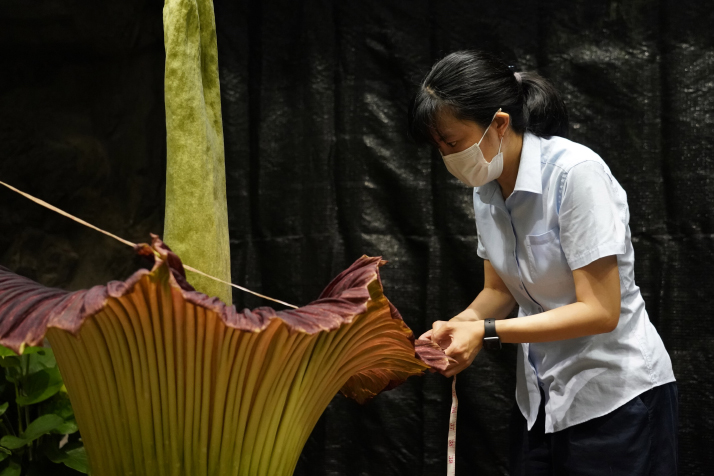BEIJING: The blooming of the Amorphophallus titanium, or titan arum, constitutes a grand event for a botanical garden. Originally from the equatorial rainforests of Sumatra, Indonesia, the plant only flowers three to four times during its lifespan of nearly 40 years but given it can only do so when it has accumulated sufficient energy in its huge underground stem, time between flowering is unpredictable, spanning from a few years to more than a decade.
But then an amazing thing happened… In July, three titan arums bloomed, one right after another, at the China National Botanical Garden in Beijing. Given the extreme rarity of this event as well as the plant’s short flowering period of 24 to 36 hours, the garden organized an event to allow visitors to take in this sensational scene.
“It’s an incredibly special plant and we hope more people can learn about the species and protect it,” Wei Yu, Executive Deputy Director of the North Garden of the China National Botanical Garden, told Beijing Review.
The titan arum happens to be one of the smelliest plants on Earth. Nicknamed the corpse flower, it has an incredibly foul smell of rotten flesh when in bloom. The flowering structure generally opens late in the afternoon, rising up to 3 meters from the ground, and the scent is released that same evening.
Scientists are still searching for the plant’s main pollinators, but it is likely the initial stench tantalizes dung beetles and carrion flies who feed and lay their eggs on rotting flesh; one study by the UC Botanic Gardens in California, the U.S., has confirmed stingless bees pollinate the plant.
“The scent changes on the second day and becomes similar to that of tropical fruits,” Wei said.
Today, it is not easy for titan arums to be pollinated naturally, and manual pollination is a major way to help them produce better fruits. In October, the three titan arums in Beijing’s botanic garden bore fruits, reddish-orange “cherries,” for the first time, setting another record for titan arum growing in China. “From blooming to fruiting, the national botanical garden has made significant progress, laying a solid foundation for further research on the species.
–The Daily Mail-Beijing review news exchange item





